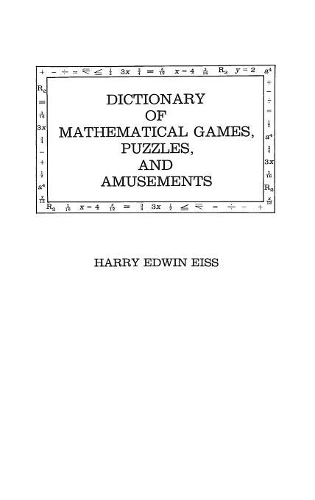
Dictionary of Mathematical Games, Puzzles, and Amusements
(Hardback)
Publishing Details
Dictionary of Mathematical Games, Puzzles, and Amusements
By (Author) Harry E. Eiss
Bloomsbury Publishing PLC
Greenwood Press
4th February 1988
United States
Classifications
Tertiary Education
Non Fiction
Puzzles and quizzes
793.74
Physical Properties
Hardback
292
Description
Mathematical play has challenged and stimulated human ingenuity throughout recorded history. It has ranged from the common sorts of brain teasers such as mazes, arithmetic story problems, and simple geometric puzzles to sophisticated explorations of questions that still concern modern mathematical theorists. This new dictionary provides a tantalizing variety of paradoxes, games, problems, and puzzles that will appeal to mathematics enthusiasts at every level of proficiency. Eiss introduces his subject with an overview of the history of recreational mathematics and its relation to some theoretical questions that have occupied mathematicians for centuries. Dictionary entries include problems posed by particular thinkers as well as traditional puzzlers that have come down to us anonymously. Information on the origins and history of many of the activities is supplied, and thorough cross-referencing enables the reader to locate all puzzles, games, and amusements of a similar type. The bibliography suggest sources of further information.
Reviews
"Similar in format to the author's Dictionary of Language Games, Puzzles, and Amusements (1986), this work complements the earlier work by adding the mathematical element.... [It] shoud find a place in large public libraries, in high schools with advanced math programs, and especially in academic libraries catering to mathematically oriented facult and students."-Reference Books Bulletin
Eiss's dictionary is really a small encyclopedia giving explanations of the concepts behind each game or puzzle, a brief history of its development, and a small supporting bibliography for further reading. . . No other work has brought together all three elements and arranged them in alphabetical order. . . Many large academic libraries will want to get this dictionary, because there is no equivalent work. . .-Choice
Similar in format to the author's Dictionary of Language Games, Puzzles, and Amusements (1986), this work complements the earlier work by adding the mathematical element.... [It] shoud find a place in large public libraries, in high schools with advanced math programs, and especially in academic libraries catering to mathematically oriented facult and students.-Reference Books Bulletin
"Eiss's dictionary is really a small encyclopedia giving explanations of the concepts behind each game or puzzle, a brief history of its development, and a small supporting bibliography for further reading. . . No other work has brought together all three elements and arranged them in alphabetical order. . . Many large academic libraries will want to get this dictionary, because there is no equivalent work. . ."-Choice
Author Bio
HARRY EDWIN EISS is Assistant Professor of English at Eastern Michigan University, Ypsilanti, Michigan.
